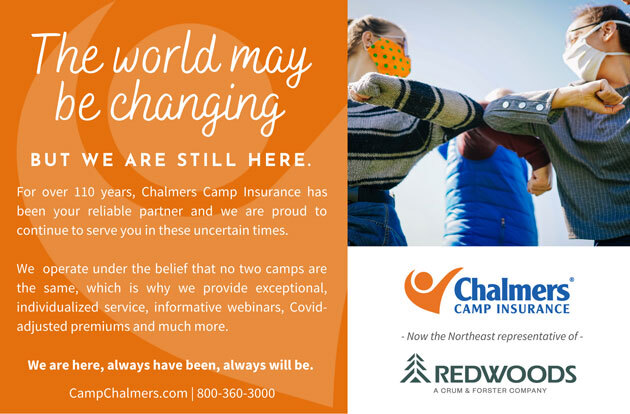Camp has completely influenced the person I am today. It has made me kinder, more patient, open-minded, and optimistic. Camp showed me how much I love being in the beautiful outdoors and how much I appreciate nature and the wonderful planet we live on. Camp is a part of me, a part of me that will forever be there. –Ava
As a young camp owner/director in the 1990s, I had several amazing mentors. Among them were Don and Carole Cheley of Cheley Colorado Camps. I marveled at their program, their alumni involvement, and how their camp was full for the following summer before the previous year even ended. In those early years, I couldn’t imagine my camp completely full, let alone finishing enrollment so early in the registration season.
But I dreamed of having the same kind of loyal following and high return rate the Cheleys and other successful camps had established over several generations, so I listened to what experienced camp directors shared, learned from them, and followed their guidance.
One of the first things the Cheleys shared was the value of strategic planning. I was on the Western Association of Independent Camps (WAIC) board when Carole (as president) had us navigate a strategic planning process. I was hooked. We immediately signed up to have our own camp’s strategic planning session with Bill Pryor, a longtime friend and colleague of the Cheleys and of WAIC.
I remain a fan of the strategic planning process, and we continue to regularly (every three to five years) hold a retreat with key camp personnel to reiterate our vision and mission, assess strengths and weaknesses, and strategize priorities and action plans for the coming years. Much of our program’s success is due to this planning process, which helps us prioritize our most important goals and assign individual accountability for making improvements. And changes actually happen.
One aspect of this strategic planning process includes articulating our “core values.” At our first meeting in 1999, we brainstormed many things we believe in, which included a long list of statements like:
- “We believe in the sanctity of childhood and the importance of kids having the chance to play and relax.”
- “We believe in the value of living without electronics and focusing instead on face-to-face relationships.”
Such statements are powerful, and it is inspiring to read them. Unfortunately, we were only reading them every few years during the strategic planning process, and these core values were not referred to regularly. After our first strategic planning meeting (the one in which we brainstormed the list), we rarely looked at the core values, and we never made any changes. At each meeting, we read through the heart-warming statements and said, “Yep, we still believe all that.” No one ever memorized the core values or reviewed them with our camp families or staff. They just lived there in the document, looking tidy as we glanced at them every few years.
I was inspired to delve more deeply into our camp’s true core values several summers ago after listening to some of our “graduating” campers talk about what they had learned and were going to take into the world. They said many things that weren’t posted on our website or in our core values list. They talked about bigger feelings and changes, things we had never dreamed of mentioning.
All of the staff who listened to what these longtime campers shared about their camp experiences were overcome with emotion. I wrote down what I could remember them saying, and then followed up by asking all our graduating and seasoned campers to complete a survey about their camp experiences.
That began the process of updating and revising our core values to more closely align with what was actually happening at camp. We ended up with a much shorter list of core values. These are now shared widely, posted throughout camp, and used during the year in our communication with campers and staff. We also choose one value to focus on more closely as part of each year’s summer theme.
The process of articulating our core values was extremely valuable, and I believe your camp can benefit from taking time to establish and communicate those values, which, when carried out in how you run all aspects of camp, establish your real culture.
Assessing Your Camp’s Current Culture and Core Values
What are your core values, those beliefs that guide your decisions about what activities to add, policies to have, and traditions and practices to honor?
Each camp has its own unique feel. To figure out your camp’s current culture and values, ask yourself and your campers and staff some or all of the following questions:
- What is the feel of your camp?
- What are the best things about your program?
- What are the most important things kids learn at your camp?
- How do your counselors feel about working at your camp?
- What traditions and practices would you never want to change?
- What current policies are written but are not being followed?
- What do campers learn beyond the activities you offer?
- When new campers arrive, what is the feeling they get?
- What does it feel like to be a camp employee?
- When camper and staff alumni think back on their time at camp, what feelings are evoked?
- When campers and staff leave at the end of their session or season, what is their parting feeling?
- How do campers and staff feel changed by their experience at camp?
- What long-lasting changes in campers occur because of their time at camp?
You can gather this information in many ways, but if you do a camper and parent evaluation at the end of camp, that’s an excellent time to ask.
If you like what you’ve heard, and the feedback from your campers, parents, and staff accurately reflects what you thought you were doing, then hooray! Using their words that came up the most often, you can probably write down 5–10 of the most important, unchangeable aspects of your camp.
Translating Your Values into Your Culture
I’m more adventurous, social, confident, mature, and just all around happier because of my time at camp. –Robert
Looking at another successful program’s website and adopting their tagline or core values will not change your culture. Culture change requires a tremendous amount of thought, soul searching, and follow-through.
Culture is not what your website or tagline says, or what you tell people about your camp.
Your camp’s culture is the environment you create and is a combination of the beliefs, habits, practices, and traditions that become the norm — “the way you do things.”
Many organizations face the same issue we did: assuming people “just know” why you believe something or do it the way you do. It’s not that simple. Clearly communicating what you believe takes a lot of planning. Camps have the additional burden of making sure that every summer we consistently review what we believe and the reason behind each value, because each season brings a new group of staff.
At the beginning of 2016, our year-round staff participated in a Disney Institute training on culture. We wanted to see how Disney trained its staff to carry out its values. We asked some good questions and came to a better understanding of one extremely important principle: you should never hire a staff person who does not believe in your core values.
Further, we learned how important it is to make sure all staff members understand their specific role in carrying out each core value. For example, one of our core values, related to creating a friendly culture at camp, is “Having fun and being happy.” How does this translate for staff? When we present that value to them, they come up with many ways they can individually make fun and happiness happen at camp. Their ideas of how they will implement this value vary, but most include smiling a lot, dancing, singing, and leading and playing games.
“Living healthy,” another of our core values, includes the mandate to be positive role models for our campers in our health habits. If someone doesn’t want to follow the healthy living guidelines we’ve established for our staff and campers, which include no drug or alcohol use and limited candy and soda, then they are not a good fit for our camp.
We now spend much more time in our precamp communication and training making sure each staff member understands how we do things and why. Even first-year staff who have never before stepped foot in our camp take ownership of each core value and gain a deeper understanding of our culture and the important role they play in making the “magic” of camp happen. Each staff team thinks through how they will contribute in their area to the overall positive camp culture. By the end of training, we have a staff who own their integral role in carrying out our camp’s values and creating our culture.
Addressing Culture Busters
Once you’ve taken time to research and articulate what you believe, and you’ve communicated those beliefs to your camp community, the next step is checking that those values are being carried out throughout your program — and addressing values that are not being practiced.
Do you have any official beliefs or policies that aren’t actually followed in practice? If so, you need to decide how important that value is to you. If it’s not important, delete or change it. If it is important, determine how to communicate it better so you get buy-in from everyone on your staff.
If you’re attempting to make a culture change in some area (inappropriate staff time-off activities come to mind as a common hurdle), know that making a change can be difficult. You will have resistors who continue to do things “the old way.” This is when you have to figure out how important the value is. If it’s not important enough to enforce, then you won’t be able to make a change, despite what you’ve written down.
Actions Do Speak Louder Than Words
At camp, I learned to communicate with people face-to-face rather than on social media. –Catherine
Your culture may already be well thought-out and clearly articulated to your entire camp community, or your culture may be something different from what you've articulated.
In practice, many organizations have official policies that are not actually supported, practiced, or felt by members of the community. So, while camp directors or senior leadership staff may hold a value, it may not be understood or supported by your staff or campers.
This is a common challenge, because some values are difficult to uphold. For example, ours is an unplugged camp, which is very important to our culture. At the center of our core values graphic is “Unplugging and Connecting Face-to-Face.” Before our staff and campers arrive, they know this value. We tell them clearly that they will never have a device in camp, turned on, during their session. On the first evening of staff training, we discuss why being unplugged is so important to our culture.
But the real culture is established for new staff members later that night when they’re in their tents getting ready for bed. If a new staff member pulls out a phone to “quickly check something” because “campers aren’t here yet,” a returning staff member will remind them we don’t use phones in camp and offer to walk them up to our staff lounge, where phones are allowed for staff. The importance of being unplugged is reinforced by people who support and live out our core values, not by the camp directors.
Our camp is now full (and unplugged) every summer, with waiting lists forming in the fall for some age groups and sessions. Like the Cheleys, we have many multiple-generation camp families. When these families tell others about our program, they don’t talk much about the recreational skills their kids learn. Instead, they talk about how our camp positively impacts their children’s character development, social skills, and mental health.
This transformative process of exploring your core values and translating those values into a positive, life-changing culture can work wonders for your camp too.
Photo courtesy of Cheley Colorado Camps, Estes Park, Colorado.
Audrey Monke, with her husband Steve, has owned and directed Gold Arrow Camp (Lakeshore, California) since 1989. On her website (sunshine-parenting.com) Audrey shares resources for parents and youth development professionals about summer camp, parenting, and happiness. Her podcast (Sunshine Parenting) features interviews with parenting authors and experts, including camp directors. Audrey’s book, Happy Campers: 9 Summer Camp Secrets for Raising Kids Who Become Thriving Adults (Hachette, 2019), shares strategies for bringing the magic of camp home.





